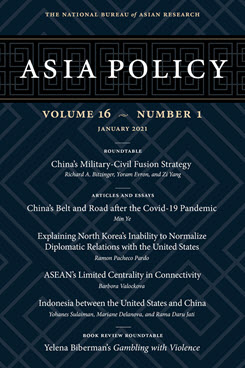Pyongyang’s Failure
Explaining North Korea’s Inability to Normalize Diplomatic Relations with the United States
This article analyzes North Korea’s failure to normalize diplomatic relations with the U.S. and argues that this failure is largely the result of Pyongyang’s poor choice of bargaining tactics.
EXECUTIVE SUMMARY
MAIN ARGUMENT
Normalization of diplomatic relations with the U.S. is a long-term North Korean foreign policy goal, dating back to 1974. Since the end of the Cold War, normalization has become a realistic prospect. Indeed, the four U.S. presidents between 1992 and 2019 reached agreements with North Korea making explicit reference to diplomatic normalization. North Korea, however, has failed in its goal even as other Communist countries and nuclear powers that are not signatories to the Nuclear Non-Proliferation Treaty have established—or maintained—diplomatic relations with the U.S. A key reason behind this failure is Pyongyang’s poor choice of bargaining tactics to negotiate with Washington. As a weak power negotiating with a more powerful counterpart, North Korea can choose whether to soft balance or bandwagon, whether to use brinkmanship, and whether to engage with multilateral regimes. Informed by its political culture, North Korea’s most common choices have included a weak commitment to soft balancing, including with South Korea; a decisive use of brinkmanship; and a rejection of international regimes. These choices have antagonized successive U.S. administrations, preventing North Korea from achieving diplomatic normalization.
POLICY IMPLICATIONS
- North Korea has a long history of making poor choices to successfully bargain with the U.S. to achieve diplomatic normalization, one of its key long-term policy goals. Pyongyang should refrain from brinkmanship, pursue soft balancing with third parties such as South Korea, and participate in multilateral regimes.
- The U.S. should nudge North Korea toward this choice of bargaining tactics, given the benefits. These benefits include lower tensions on the Korean Peninsula, a clear choice presented to Pyongyang, and the possibility of discussing denuclearization.
-
The U.S. should approach relations with North Korea fully aware that normalization of diplomatic relations is a long-term foreign policy ambition that could persuade Pyongyang to contemplate denuclearization in the future. Without diplomatic normalization, however, denuclearization is not a realistic goal.
Ramon Pacheco Pardo is a Reader (Associate Professor) in International Relations at King’s College London (United Kingdom) and the KF-VUB Korea Chair at the Institute for European Studies of Vrije Universiteit Brussel (Belgium).
About Asia Policy
Asia Policy is a peer-reviewed scholarly journal presenting policy-relevant academic research on the Asia-Pacific that draws clear and concise conclusions useful to today’s policymakers. Asia Policy is published quarterly in January, April, July, and October and accepts submissions on a rolling basis. Learn more


